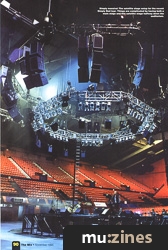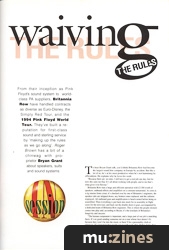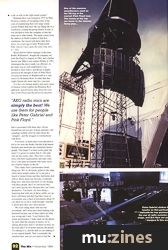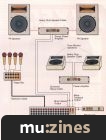Magazine Archive
Home -> Magazines -> Issues -> Articles in this issue -> View
Article Group: | |
Waiving the rules | |
Britannia RowArticle from The Mix, November 1994 | |
A major hire company of legendary status
From their inception as Pink Floyd's sound system to world-class PA suppliers, Britannia Row have handled contracts as diverse as Euro-Disney, the Simply Red Tour, and the 1994 Pink Floyd World Tour. They've built a reputation for first-class sound and sterling service by 'making up the rules as we go along'. Roger Brown has a bit of a chinwag with proprietor Bryan Grant about speakers, suits and sound systems

Simply massive! The satellite stage setup for the recent Simply Red tour. Things are complicated by having both a main stage and this satellite stage halfway down the auditorium.
To hear Bryan Grant talk, you'd think Britannia Row had become the largest sound hire company in Europe by accident. But like a lot of us, he's at his most productive when he's not hamstrung by officialdom. He explains why he loves his work:
"Because there are no rules. I still have to get a real job one day, but for now this suits me fine. It's all about working with people, and to me that's what gives it its flavour."
Britannia Row runs a huge and efficient operation with £3.5M worth of speakers, outboard effects and amplifiers on a constant turnaround. As soon as a rig returns from a tour, it's checked over by one of Britannia's engineers, the speaker cabs are stripped down, any broken cones replaced, and the cabinets resprayed. All outboard gear and amplification is bench-tested before being reassembled. Then everything is put back into stock for re-assembly in flight cases for the next tour, and back out the double doors it goes, accompanied by a dedicated team of Britannia Row engineers. This is where the people element comes into play and, according to Bryan, it's the lynchpin of Britannia's longevity and success.
"The human component is important, and a large part of our job is matching faces. It's no good sending someone out on a tour whose face doesn't fit, because they won't be into the music or there'll be a personality clash or whatever. It's important that people get on with each other. If they don't, then the artist won't be coming back to us for the next tour. Everyone's out on the road, schedules are tight and everyone is under intense pressure, so it's only going to add to that pressure. Our task is to make everyone's life easier, not more difficult. So a large part of our service is providing the right people to do a job, as well as the right sound system."
Britannia Row was formed in 1975 by Pink Floyd as a means of recouping some of the costs of maintaining their own large sound system. Rather than have the rig sitting idle in a warehouse, costing the group money in rent, it was decided to form the company to hire the setup out to other bands. The name comes from the address in North London of that first warehouse, but stayed with them after their move, two years ago to leafy Wandsworth Park. (Doesn't have quite the same ring, does it? - Ed).

The captain of the the good ship Britannia, Brian Grant, is one of the live sound industries' mavericks. One day he's planning on 'getting a proper job - but not just yet.'
Bryan and his fellow manager at the time, Robby Williamson, bought the company out from the Floyd in August of 1984, and a further buyout saw Mike Lowe replace Robby in 1991, whereupon the move south was effected. As the name was so well established it was decided to stick with it, and Bryan is highly amused at the thought of fans of Pink Floyd scouring the streets of Wandsworth in a vain search for Britannia Row, in order that they might liberate the street sign for a souvenir.
"AKG radio mics are simply the best! We use them for people like Peter Gabriel and Pink Floyd."
It is this very human quality and warm sense of humour which typifies the Britannia Row approach, and obviously dates from the early days of the Floyd and the perceived mayhem that is associated with those days. Bryan himself has not lost any of those attitudes, still sounding credible when he talks about the 'straights', and the struggle to communicate with them.
"You know, in those days everyone tried to tell us we were the freaks, but this is an honest business and musicians are essentially honest people. The longer I've been in the game the more I've grown to realise that it's the suits who are the wacky ones. They have a clean front with their organisations and natty suits, but it's the quiet accountant who turns out to have had his fingers in the till."
"They make such a performance about things too. We've obviously gotten to the stage where these people realise we're not just a bunch of stoned freaks and they had better deal with us. Rock music has become a corporate thing now, and more and more we are dealing with these people. But I'm convinced they can't trust anyone else, because they can't trust themselves. You know, we were doing a financing deal with one of these outfits, we sat down with them and they had their room of accountants and a sheaf of documents about 10 cms thick for us all to wade through. And this is all because they can't trust anyone.
"We were sitting there with our one accountant, and I must have been looking a bit bemused because one of them asked me what was wrong and I said, 'I can't believe this whole performance, I make deals on the phone for more than the amount of money we're talking about here and it's all done on trust, on the basis that I'm an honest person, the person I'm talking to is, and the deal we are making is to our mutual benefit. That's essentially the situation here, and yet you seem to feel the need to have everything itemised to the nth degree. What's the matter, don't you trust each other?' Then it was their turn to look bemused. I don't think they understood the concept of people trusting each other."

One of the massive soundtowers used on the US leg of the current Pink Floyd tour. The hoods at the top are home to the famous flying pigs...
Of course Britannia didn't become the biggest just from being nice guys, but from things like the quality of their sound. A quick look at the photograph of one of their speaker stacks from the current Pink Floyd tour had me worried. Where were the mountain of cabs I associated with these monsters of sound? Bryan smiled the smile of someone who had an ace up his sleeve.
"That's down to our Turbosound Flashlight speakers. Flashlight might seem a strange name for a speaker, but they're called that because they direct the sound very accurately, in the same manner as a flashlight. This means we can position them with pin-point accuracy to direct the sound in a venue, and fill up any blank spots our engineers might find, rather than the old scattergun effect which just fills up the whole room to the maximum by overloading everything. This is much better, enabling you to hear the room, not the system. It is also much more cost-efficient, as we only need half the tonnage to transport a system, and there's obviously less time involved in setting up."
"I don't think we'd actually be able to fit all the gear in here, if it were all to come back at once"
Providing sound is not just a matter of huge speaker stacks, and a large part of Britannia's operation is in the 'Prep Room', where racks of effects, FOH amplifiers, compressors, noise gates and remote units for the AKG wireless microphones are assembled in flight cases, with all leads hard-wired into military multiconnectors at the back, from where they can be quickly patched into a complete stage system.

Peter Gabriel shakes his touche on this particular catwalk; he has pioneered the use of radio systems on stage, and Brit Row are past masters in this area
When it comes to microphones, Britannia's stockroom boasts an impressive array of Shures, Sennheisers and all your other favourite voice sticks, yet when a wireless system is called for, it's AKG that Britannia swear by.
"They're simply the best." opines Bryan, "The system doesn't break down and always stays on track. We use them a lot with people like Peter Gabriel and Pink Floyd, both of whom were early pioneers in the use of remote mics, and we need something that is reliable and doesn't have stray signals messing up the other receivers. AKG have certainly proven themselves to be the best in our experience."

Left: Serious sound system! Turbosound power amps and BSS graphics fill a typical Britannia Row rack. Spare a thought for the roadies...
Brook Siren Systems provide most of the front-of-house amplifiers racked in Britannia's flightcases, with their EPC 760 and 780 and associated crossovers much in evidence alongside various other amps from Cambridge Audio and Turbosound. Once again, when it comes to amplifiers Britannia look for durability and reliability, essential for items that will be shipped all over the world.
"You should be able to hear the room, not the system"
"When we test these babies, we just drop 'em on the floor." admits Phil, one of many freelance engineers testing equipment in 'The Toyroom', Britannia's test area for all gear. "On tour that's exactly what is likely to happen to them, and if they can't handle that in here, they'll be useless out on the road. It may seem a bit extreme, but that's typical of Britannia's total approach to quality. You know they respray all cabinets before sending them back out again, even if it's only a scratch, and people appreciate that commitment. I was out in Moscow recently on a tour, and once they knew I worked for Britannia they were awestruck and wanted me to mix for them, even though I'm just a sound engineer. It was simply because I was associated with Britannia; that's how far their reputation is known."

Fresh from the Peter Gabriel tour is 'sound consultant' Hugh Richards, seen here reconfiguring a Yamaha PM4 for the upcoming outing with Diana Ross.
Sound consultant Hugh Richards was in the process of re-configuring the Yamaha PM4 mixing desk for the Diana Ross tour, having just finished the Peter Gabriel dates, and he took the time out from this arduous task to explain just what made the desk so good.
"Basically each channel strip here is removable and individually configurable, so I can set it all up for whatever modules, effects send and returns and mic levels or whatever is needed for each strip. That way there is the minimum of fuss setting up at each venue. The military connectors from the effects racks just get plugged straight into the send and return connectors on the desk, so hooking up is simplicity itself."
It may seem easy to Hugh, but this is all highly skilled work. Britannia rely on a large pool of specialised people who are happy to work on a freelance basis, as the turnaround here is very rapid with only 10-20% of the stock actually being in for repair and 'prepping' at any given time.
"I don't think we'd actually be able to fit all the gear in here, if it were all to come back at once", laughs Bryan, "luckily our schedule has always been full, so things remain on a constant turnaround".

Above: Busy diary, or what? The Britannia Row noticeboard displays current and imminent tours with Pink Floyd, Bryan Ferry, Santana, Diana Ross and M-people, amongst many others.
The task of keeping track of all this gear and assigning it falls to the team in the office at Britannia, who use an Excel database on their Macs, to log all incomings and outgoings. A large melamine board at the end of the room serves as an immediate visual guide to just who is playing where at any given time, and when their gear is due for return or shipping. This board is testament to just how busy Britannia really is, with Pink Floyd, Diana Ross, Hank Marvin, the Pet Shop Boys and Slayer all up on the board for the week we were there, and nary a blank spot in sight.
Britannia may have once ruled the waves, but as Rupert Murdoch once quipped, "the only reason the sun never set on the Empire was because God didn't trust the Brits after dark". Not the sort of cynicism to appeal to Britannia Row, but then Bryan would rather waive the rules. All power to their rowlocks!
More with this topic
PA Column |
PA Column |
Live Sound - Introduction To PA (Part 1) |
Feedback |
Going For Broke |
 Bad Gigs |
So You Want To Be A... - FOH Engineer |
 Driving For Roadies - lesson one |
 Overtones - Gig Tactics |
Four soundchecks in one day... - Later with Jools Holland |
A Long Alone in London - A Long Ryder Writes... |
Sounds good, John |
Browse by Topic:
Live
Publisher: The Mix - Music Maker Publications (UK), Future Publishing.
The current copyright owner/s of this content may differ from the originally published copyright notice.
More details on copyright ownership...
In Session
Feature by Roger Brown
Previous article in this issue:
Next article in this issue:
Help Support The Things You Love
mu:zines is the result of thousands of hours of effort, and will require many thousands more going forward to reach our goals of getting all this content online.
If you value this resource, you can support this project - it really helps!
Donations for April 2024
Issues donated this month: 0
New issues that have been donated or scanned for us this month.
Funds donated this month: £7.00
All donations and support are gratefully appreciated - thank you.
Magazines Needed - Can You Help?
Do you have any of these magazine issues?
If so, and you can donate, lend or scan them to help complete our archive, please get in touch via the Contribute page - thanks!



















